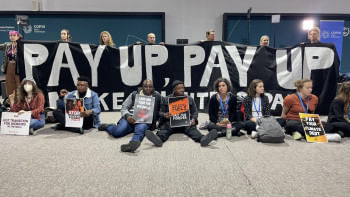Chhayanaut: A bulwark of culture

The red-bricked façade with its parapets grazing against the sky on Satmasjid road stands like a fortress that has remained unyielding through time. And indeed history has been a testament to Chhayanaut as a bastion of culture as it triumphed through the Liberation War, and continues stronger than ever today.
Today marks 50 years of the Borshoboron programme ushering in the Bangla New Year at Ramna Botomul, which Chhayanaut initiated in a bold move against an oppressive West Pakistan rule since 1967.
To commemorate their momentous journey, Chhayanaut has been holding month-long programmes, including a photo exhibition at the institute premises depicting Borshoboron at Ramna Botumul over the years. However, these are not artistic shots of the event; the organisation features their resilience through documentation. The wooden banisters of the landing on each floor were adorned with news archives of the celebrations over the years, including the tragic incident of 2001 when bomb blasts at Ramna Botumul took away precious lives on the programme day. However, as depicted in the photos, Chhayanaut is ever stalwart to their cause by fighting forward with the continuance of the festival in the following years.

Laisa Ahmed Lisa, general secretary of the institution stated, “At Chhayanaut we work with unity, and all decisions are made unanimously. We do our utmost to preserve tradition and culture by ensuring practices will go on as they have always been. We look forward to the cooperation and love from the people in order to fulfill our goals.”
In our ever changing society, constancy in tradition and culture are what remains in evidence of our roots. As described by Khairul Anam Shakil, vice president of the institution: “Cultural identity is passed down through generations through word of mouth, which we hold on to dearly. If the future generations do not have avenues to understand Bangla art and culture in its authentic and true form, then a vital part to our understanding of history and self-identity will be lost. It is essential to shoulder the responsibility of ensuring this is carried on as it has always been for thousands of years. The true identity to any country is culture, and every citizen is its representative.”


 For all latest news, follow The Daily Star's Google News channel.
For all latest news, follow The Daily Star's Google News channel. 



Comments